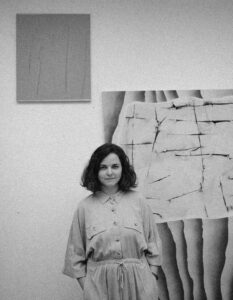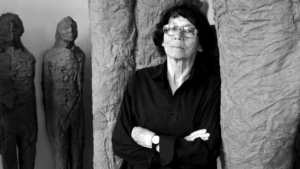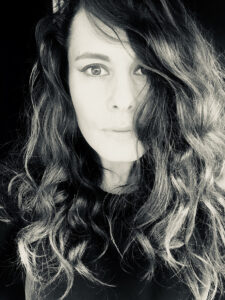Darinka Pop-Mitić

– graduated from the Faculty of Fine Arts in Belgrade, Serbia, Department of Painting. She also studied political science. She is the author of several works in public space. She regularly publishes texts in the field of fine and applied arts. She exhibited at numerous solo and group exhibitions in Serbia and abroad, among which the most significant are: “Bigger Than Myself, Heroic Voices from ex-Yugoslavia”, Museo MAXXI, in Rome, Italy (2021); “A Sporadic Suspension of Time”, Gallery-Legacy of Milica Zorić & Rodoljub Čolaković, Museum of Contemporary Art, Belgrade, Serbia (2022). Awards: Award of the 49th October Salon “Artist Citizen”, Belgrade, Serbia (2008); Award of the AICA Association with the Spomenik group, Belgrade, Serbia (2008); Award of the 50th October Salon “Circumstance”, Belgrade, Serbia (2009); REX Cultural Centre Award “A Message to the Woodpecker and a Message to the Goldfinch”, Belgrade, Serbia (2020); ULUS Gold Award for Expanded Media, Belgrade, Serbia (2021).
I view my artistic practice as a cross-section of the state of things. I am interested in how objects and events and the way we look at them change depending on the context – historical, political and our own, personal, familial.
I make these internal lists in different ways. Sometimes I make travelogue drawings of events that I haven’t attended that are significant for my work. The work “Comrade/ess Woman” 123456 – created in 2012 as part of the exhibition “Dowry” – creates a visual chronology of the first feminist conference in Yugoslavia in 1978, which questioned the limits of achieved emancipation. I juxtapose the portraits of the participants, parts of their presentations with the fact that my sister was born that year, thus threading my own “birth” thread through that event.
I look for the language of reality in the intersection of low art genres and the “forms of resistance of quotidian life” colliding with mundaneness and the way in which gender, sex, family and class relations are refracted through it. The work “Stupid as a Painter”7 (2015 – 2018) in which, over a long period of time, on a sheet of daily newspaper, bought that day, I paint the breakfast that I prepared for my little daughter Irma and her namesake – my paralised, almost hundred-year-old grandmother who I took care of until her death, owes its creation to Courbet’s prison still lifes (created after the failure of the Paris Commune) and the literary bricolage of the modern novel that cuts into the daily politics and everyday life.
Part of the work “Stupid as a Painter” was also created during my stay in the hospital at the time of my second pregnancy when I painted my hospital meals. I am fully aware that the precariousness of artistic work, endeavouring to obtain a health insurance card and manage the bill, accompanies the non-profession of an artist. Laws and rules change that, but here and now, in this world, the existence of even the minimal guarantees of security through guild solidarity is like closing the hunting season to suppress the brutality of capitalism a little.
The collapse of socialist Yugoslavia is the event that had the greatest impact on my generation and on the position of women in our society, and I am not running away from that.
My artistic practice also consists of a non-critical inventory, like with an amateur archaeologist – of artefacts and the meanings of Yugoslav socialism – its relation to the issues of gender, class and ethnicity. In the conditions of the re-traditionalization of society, this list takes on the contours of urgency, since the things related to that period disappear, are being taken away by resellers or destroyed by vandals.
The work “Useful Idiot”8 (2015) maps the trail of the privatisation of public goods by marking buildings that were once the production facilities of the future and have now become “attractive” real estate with small frescoes with stylized representations of former production activities. I am exhibiting this map together with photos of the remaining “frescoes”. The title of the work alludes to the fact that if the revolutionary character of art is impossible today, then I am not running away from the role of a useful idiot, of some future – as of yet unclear to me – policy of equality.
It is possible that this urgency is a consequence of the historical defeat experienced by the idea that Yugoslavia embodied. The feeling of defeat as well as the need to mark and remember it and thus “put it in a cold pack” as a pledge for the future is also visible in the work “On Solidarity”9 (2005), an attempt to restore the mural of solidarity of the people of Yugoslavia with the peoples of Latin America and especially Chile from the time of the military dictatorship. That mural is now neglected and only the contours are visible and my performative “refreshing of the paint” was only made possible to the extent of which the documentation of the mural was preserved in the gallery of the Student Cultural Centre. Its incompleteness is not a problem for me and I hope that one day it will be completed by my hands or someone else’s.
The text was written in collaboration with Mirjana Dragosavljević (2022).
1Darinka Pop-Mitić, "Comrade/ess Woman", 2012, courtesy of the artist.2Darinka Pop-Mitić, "Comrade/ess Woman", 2012, courtesy of the artist.
3Darinka Pop-Mitić, "Comrade/ess Woman", 2012, courtesy of the artist.
4Darinka Pop-Mitić, "Comrade/ess Woman", 2012, courtesy of the artist.
5Darinka Pop-Mitić, "Comrade/ess Woman", 2012, courtesy of the artist.
6Darinka Pop-Mitić, "Comrade/ess Woman", 2012, courtesy of the artist.
7Darinka Pop-Mitić, "Stupid as a Painter", 2018, courtesy of the artist.
8Darinka Pop-Mitić, "Useful Idiot", 2018, courtesy of the artist.
9Darinka Pop-Mitić, "On solidarity", 2005, courtesy of the artist.
– je završila Fakultet likovnih umetnosti u Beogradu u Srbiji, odsek Slikarstvo. Studirala je i političke nauke. Autorka je više radova u javnom prostoru. Redovno objavljuje tekstove iz oblasti likovne i primenjene umetnosti. Izlagala je na brojnim samostalnim i grupnim izložbama u zemlji i inostranstvu, među kojima su značajnije: „Biger than Myself, Heroic Voices from ex-Yugoslavia“, Museo MAXXI, u Rim, Italija (2021); „Povremeno zaustavljanje vremena“, Legat Čolaković, Muzej savremene umetnosti Beograda, Beograd, Srbija (2022). Nagrade: Nagrada 49. Oktobarskog salona “Umetnik građanin, umetnica građanka”, Beograd, Srbija (2008); Nagrada Udruženja AICA sa grupom Spomenik Beograd, Srbija (2008); Nagrada 50. Oktobarskog salona “Okolnost”, Beograd, Srbija (2009); Nagrada Kulturnog centra REX “Poruka detliću i poruka češljugaru”, Beograd, Srbija (2020); Zlatna plaketa ULUS-a za proširene medije, Beograd, Srbija (2021).
Svoju umetničku praksu vidim kao presek stanja stvari. Mene interesuje kako se predmeti i događaji i način na koji ih gledamo menjaju zavisno od konteksta – istorijskog, političkog i našeg, ličnog, porodičnog.
Te interne popise pravim na različite načine. Ponekad pravim putopisne crteže događaja kojima nisam prisustvovala a koji su značajni za moj rad. Rad “Drug-ca žena”123456 – nastao 2012. godine u okviru izložbe “Miraz” – stvara vizuelnu hronologiju prve feminističke konferencije u Jugoslaviji 1978. godine koja je propitivala limite ostvarene emancipacije. Portrete učesnica, delove njihovih izlaganja jukstapozicioniram sa činjenicom da mi se te godine rodila sestra na taj način provlačeći sopstvenu “rodnu” nit kroz taj događaj.
Jezik stvarnosti tražim u preseku niskih likovnih žanrova i “oblika otpora svakodnevnog života” u sudaru sa svakodnevicom i načinom na koji se kroz nju prelamaju rod, pol, porodični i klasni odnosi. Rad “Glup kao slikar”7 (2015 – 2018) u kojem tokom dužeg vremenskog perioda na listu dnevnih novina, kupljenih tog dana, slikam doručak koji sam spremala mojoj maloj kćerci Irmi i njenoj imenjakinji, mojoj nepokretnoj, gotovo stogodišnjoj baki o kojoj sam se starala do njene smrti duguje svoj nastanak Kurbeovim zatvorskim mrtvim prirodama (nastalim nakon neuspeha Pariske komune) i literarnom brikolažu modernog romana koji preseca dnevnu politiku i svakodnevicu.
Deo rada “Glup kao slikar” nastao je i tokom mog boravka u bolnici tokom druge trudnoće kada sam slikala svoje bolničke obroke. Potpuno sam svesna da prekarnost umetničkog rada, dovijanje za zdravstvenu knjižicu i račun, prati ne-profesiju umetnika. Zakoni i pravila to menjaju ali ovde i sada, u ovom svetu, postojanje makar minimalnih garancija sigurnosti kroz esnafsku solidanost je nalik uvođenju lovostaja kako bi se malo suzbila brutalnost kapitalizma.
Raspad socijalističke Jugoslavije je događaj koji je najviše uticao na moju generaciju i na položaj žena u našem društvu i od toga ne bežim.
Moja umetnička praksa se sastoji i iz nekritičkog popisa, poput arheologa amatera, artefakata i značenja jugoslovenskog socijalizma – njegove relacije sa pitanjima roda, klase i etničke pripadnosti. U uslovima retradicionalizacije društva ovaj popis dobija obrise urgentnosti pošto stvari vezane za taj period nestaju, odnete od nakupaca ili uništene od vandala.
Rad “Korisni idiot”8 (2015) mapira tragove privatizacije javnog dobra obeležavajući zgrade koje su nekada bili pogoni proizvodnje budućnosti a sada su postale “privlačne” nekretnine malim freskama na kojima su stilizovane predstave nekadašnje proizvodne delatnosti. Ovu mapu izlažem zajedno sa fotografijama preostalih “fresaka”. Naziv rada aludira na to ukoliko je revolucionarnost umetnosti danas nemoguća onda ne bežim od uloge korisnog idiota, neke buduće, meni još nejasne politike jednakosti.
Moguće je da je ova urgenicija posledica istorijskog poraza koji je doživela ideja koju je Jugoslavija oličavala. Osećaj poraza kao i potreba da se on obeleži i zapamti i da se na taj način “stavi u hladno pakovanje” kao zalog budućnosti je vidljiv i u radu “O Solidarnosti”9 (2005), pokušaju da se obnovi mural solidarnosti naroda Jugoslavije sa narodima Latinske Amerike a naročito Čilea iz vremena vojne diktature. Taj mural je zapušten i naziru se samo konture, moje performativno “osvežavanje farbe” bilo je moguće samo u onoj meri u kojoj su sačuvani dokumenti u galeriji Studentskog kulturnog centra. Njegova nedovršenost za mene nije problem i nadam se da će jednom biti dovršen mojim ili nekim drugim rukama.
Tekst je napisan u saradnji sa Mirjanom Dragosavljević (2022).
1Darinka Pop-Mitić, “Drug-ca žena”, 2012, ljubaznošću umetnice.2Darinka Pop-Mitić, “Drug-ca žena”, 2012, ljubaznošću umetnice.
3Darinka Pop-Mitić, “Drug-ca žena”, 2012, ljubaznošću umetnice.
4Darinka Pop-Mitić, “Drug-ca žena”, 2012, ljubaznošću umetnice.
5Darinka Pop-Mitić, “Drug-ca žena”, 2012, ljubaznošću umetnice.
6Darinka Pop-Mitić, “Drug-ca žena”, 2012, ljubaznošću umetnice.
7Darinka Pop-Mitić, “Glup kao slikar”, 2018, ljubaznošću umetnice.
8Darinka Pop-Mitić, “Korisni idiot”, 2018, ljubaznošću umetnice.
9Darinka Pop-Mitić, “O solidarnosti”, 2005, ljubaznošću umetnice.



